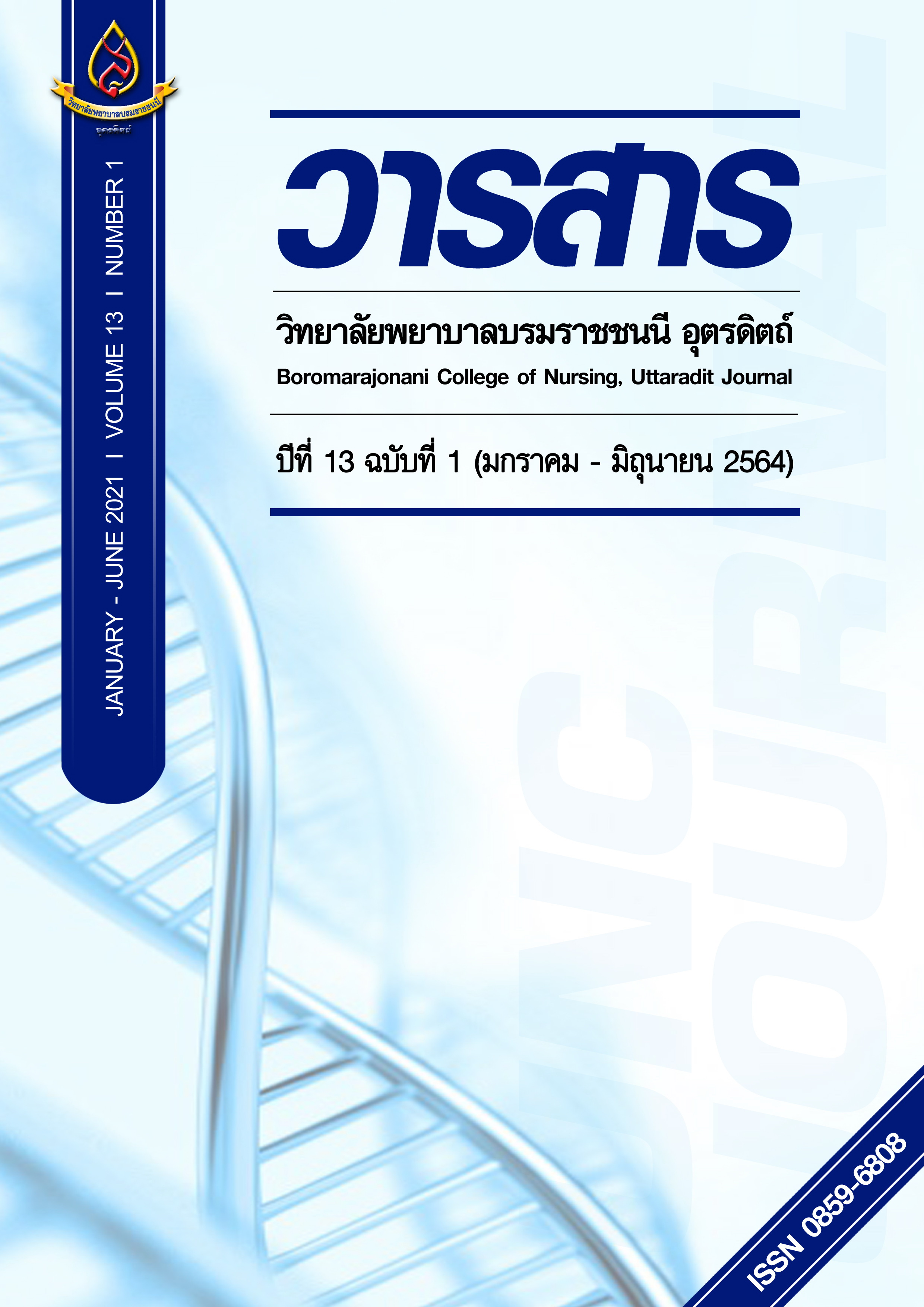วิธีการส่งเสริมการจัดการยาควบคุมระดับน้ำตาลในเลือด ของผู้ป่วยเบาหวานชนิดที่ 2 ในประเทศไทย: การสังเคราะห์งานวิจัยอย่างเป็นระบบ
Main Article Content
บทคัดย่อ
เบาหวานเป็นปัญหาสาธารณสุขที่สำคัญของประเทศไทย การทบทวนงานวิจัยอย่างเป็นระบบครั้งนี้มีวัตถุประสงค์เพื่อสังเคราะห์วิธีการการส่งเสริมการจัดการยาเพื่อควบคุมระดับน้ำตาลในเลือดของผู้ป่วยเบาหวานชนิดที่ 2 ในประเทศไทยและผลลัพธ์ของการดำเนินการตามวิธีการดังกล่าว งานวิจัยที่เกี่ยวข้องที่ตีพิมพ์ตั้งแต่ 1 มกราคม 2553 จนถึง 31 มิถุนายน 2563 ได้รับการสืบค้นจากฐานข้อมูลอิเล็กโทรนิกส์ ได้แก่ ThaiLis, ThaiJo, CINAHL, Google scholar และ ScienceDirect มีงานวิจัยที่ผ่านเกณฑ์การประเมินจำนวน 7 เรื่อง ผลการศึกษาพบว่า วิธีการส่งเสริมการจัดการยาเพื่อควบคุมระดับน้ำตาลในเลือดของผู้ป่วยเบาหวานชนิดที่ 2 ในประเทศไทย สามารถสรุปได้ 4 ประเด็น คือ 1) การส่งเสริมการจัดการยาโดยการขับเคลื่อนของเภสัชกร และ 2) การสอนโดยการมีอุปกรณ์ช่วยสอน 3) การสอนร่วมกับการสร้างแรงสนับสนุนทางสังคม และ 4) การใช้อุปกรณ์ช่วยเตือนการใช้ยา โดยทั้ง 4 วิธีการสามารถช่วยส่งเสริมผลลัพธ์ทางคลินิก คือ ระดับน้ำตาลสะสมในเลือด หรือระดับน้ำตาลในเลือดของผู้ป่วยเบาหวานลดลง และช่วยให้ผลลัพธ์ทางด้านพฤติกรรมการใช้ยามีประสิทธิภาพดีขึ้น ดังนั้นผู้เขียนมีข้อเสนอแนะว่าบุคลากรทางสุขภาพควรนำวิธีการส่งเสริมการจัดการยาดังกล่าวไปใช้สำหรับผู้ป่วยเบาหวานเพื่อให้สามารถควบคุมระดับน้ำตาลในเลือดได้ นอกจากนี้การศึกษาวิจัยในอนาคตควรมีการเพิ่มขนาดตัวอย่างที่มีขนาดใหญ่ขึ้น
Article Details
บทความหรือข้อคิดเห็นใดใดที่ปรากฏในวารสารวิจัยการพยาบาลและวิทยาศาสตร์สุขภาพ เป็นวรรณกรรมของผู้เขียน ซึ่งบรรณาธิการหรือสมาคมศิษย์เก่า ไม่จำเป็นต้องเห็นด้วย และบทความที่ได้รับการตีพิมพ์เผยแพร่ถือเป็นลิขสิทธิ์ของวารสารวิจัยการพยาบาลและวิทยาศาสตร์สุขภาพ
เอกสารอ้างอิง
Adikusuma, W., & Qiyaam, N. (2017). The effect of education through short message service (SMS) messages on diabetic patients’ adherence. Scientia Pharmaceutica, 85(2), 23. Retrieved from https://doi.org/10.3390/scipharm85020023.
Boonsiri, V. (2010). Results of self-help group on diabetic patients Tungtom Sub District Sapatong District Chiang Mai Province. Lanna Public Health Journal, 6(1), 45-53.
(in Thai).
Chaimol, P., Lerkiatbundit, S, & Saengcharoen, W. (2017). Effects of education by pharmacists supplemented with pictograms on the use of medications in diabetic patients. Thai Journal of Pharmacy Practice, 9(2), 475-488. (in Thai).
Division of Non-communicable Diseases, Ministry of Public Health. (2015). World diabetes
day 2015. Retrieved from http://thaincd.com/2016/media-detail.php?id=10551&tid=&gid=1-015-001. (in Thai).
Division of Non-communicable Diseases, Ministry of Public Health. (2019). Numbers and incidence rate of in-patient of 2016- 2018 (hypertension, diabetes, coronary disease, cardiovascular diseases, and COPD). Retrieved from http://www.thaincd.com/2016/mission/documentsdetail.php?id=13684&tid=32&gid=1-020. (in Thai).
Downs SH., & Black N. (1998). The feasibility of creating a checklist for the assessment of
the methodological quality both of randomized and non-randomized studies of health care interventions. Journal of Epidemiology Community Health, 52, 377-384.
Holcomb L. S. (2015). A taxonomic integrative review of short message service (SMS) methodology: A framework for improved diabetic outcomes. Journal of Diabetes Science and Technology, 9(6), 1321–1326.
International Diabetes Federation. (2017). Diabetes atlas, 8th edition 2017. Retrieved
from http://fmdiabetes.org/wp-content/uploads/2018/03/IDF-2017.pdf
Jaturapattarapong, W., & Sakthong, P. (2013). Outcomes of medication therapy management in diabetic outpatients. Thai Pharmaceutical and Health Science Journal, 8(4), 133-142. (in Thai).
Jiamjarasrangsi, W. (2013). Self-management support interventions for type 2 diabetic patients. Chulalongkorn Medical Journal, 57(3), 279-291. (in Thai).
Kapukeaw, N. (2019). The development of a drug monitoring model for the elderly with diabetes “Diabetes Drug Calendar” in Phabatnasing Tambol Health Promotion Hospital, Rattanawapi District, Nongkhai Province. Retrieved from
Khunti, N., Khunti, N., & Khunti, K. 2019). Adherence to type 2 diabetes management. British
Journal of Diabetes, 19(2), 99-104.
Lam Thap Hospital. (2017). The effects of pharmaceutical care in diabetic patients using
insulin injection. Retrieved from http://61.19.80.156/rpho11/upload/news/news-doc-00330.pdf. (in Thai).
Lekpet, J., & Pitchayapaibul, J. (2011). Medication therapy management for type 2 diabetic out-patients by the pharmacist. Thai Pharmaceutical and Health Science Journal, 6(4), 274-281. (in Thai).
Ratarasarn, C. (2020). Present situation and cooperation for diabetes treatment reform in
Thailand. Retrieved from https://www.novonordisk.com/content/dam/Denmark/HQ/sustainablebusiness/performance-on-tbl/more-about-how-we-work/. (in Thai).
Rongmuang, D., Thongdee, J., & Songsri, C. (2016). The nursing’ role in caring the person
with diabetes mellitus receiving glycemic control medication in community. Nursing Public Health and Education Journal, 17(3), 1-16. (in Thai)
Saendaeng, N., & Potisupsuk, C. (2018). Effects of drug use behaviors promotion program
in elderly patients with non-communicable diseases, Khemarat District, Udonratchatani Province. Journal of Nursing and Health Care, 36(3), 33-41. (in Thai).
Sapkota, S., Brien, J-aE., Greenfield, J. R., & Aslani, P. (2015). A systematic review of interventions addressing adherence to anti-diabetic medications in patients with type 2 diabetes components of interventions. PLoS ONE, 10(6), e0128581. Retrieved from https://www.ncbi.nlm.nih.gov/pmc/articles/PMC4460122/
Schoenthaler, A., & Cuffee, Y. L. (2013). A systematic review of interventions to improve adherence to diabetes medications within the patient-practitioner interaction. Journal of Clinical Outcomes Management, 20(11), 494-506.
Shrestha, S. S., Shakya, R., Karmacharya, B. M., & Thapa, P. (2013). Medication adherence to oral hypoglycemic agents among type II diabetic patients and their clinical outcomes with special reference to fasting blood glucose and glycosylated hemoglobin levels. Kathmandu University Medical Journal, 11(43), 226–232.
Srisaket, J., Chaisa, P., Wanchai, A., Meeboonmak, Y., & Phokhwang-Just, W. (2017). Diet consumption behavior modification patterns to control blood sugar levels of patients with diabetes in Thailand: A systematic review. EAU Heritage Journal, 11(2), 156-170. (in Thai).
Thanakornjuk, K., & Kessomboon, N. (2013). Outcome evaluation of diabetes medication therapy management in patients with type 2 diabetes controlled by insulin at That Uthen Hospital. Journal of Health Systems Research, 7(1), 1-9. (in Thai).
van Eikenhorst, L., Taxis, K., van Dijk, L., & de Gier, H. (2017). Pharmacist-led self-management interventions to improve diabetes outcomes. A systematic literature review and meta-analysis. Frontiers in pharmacology, 8, 891. Retrieved from https://doi.org/10.3389/fphar.2017.00891
Williams, J. L., Walker, R. J., Smalls, B. L., Campbell, J. A., & Egede, L. E. (2014). Effective interventions to improve medication adherence in Type 2 diabetes: A systematic review. Diabetes Management, 4(1), 29-48.
Wongket, W. (2016). Medication-taking behaviors of non-insulin dependent diabetic patients in diabetic clinic at Phon charoen hospital, Buengkan province. Proceedings of the 2nd Phon Charoen Research and Innovation Festival, 25 November 2016 at Phon Charoen Hospital, Bueng Kan Province. Retrieved from
.https://bkpho.moph.go.th/ssjweb/bkresearch/require/files/post-doc/20171016100157.pdf. (in Thai).


